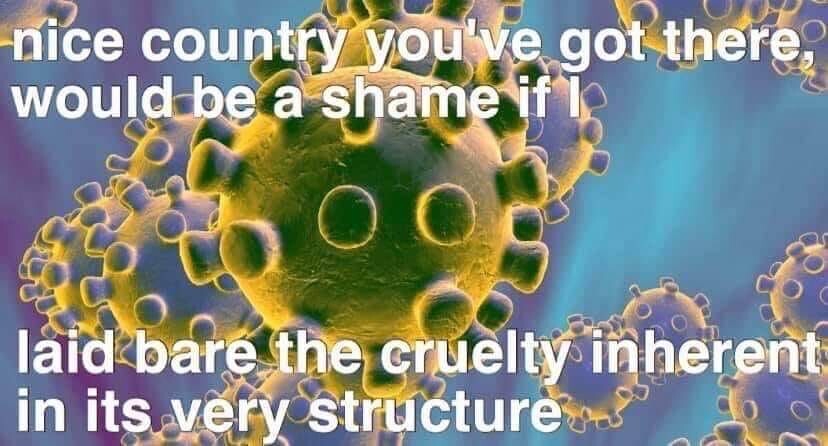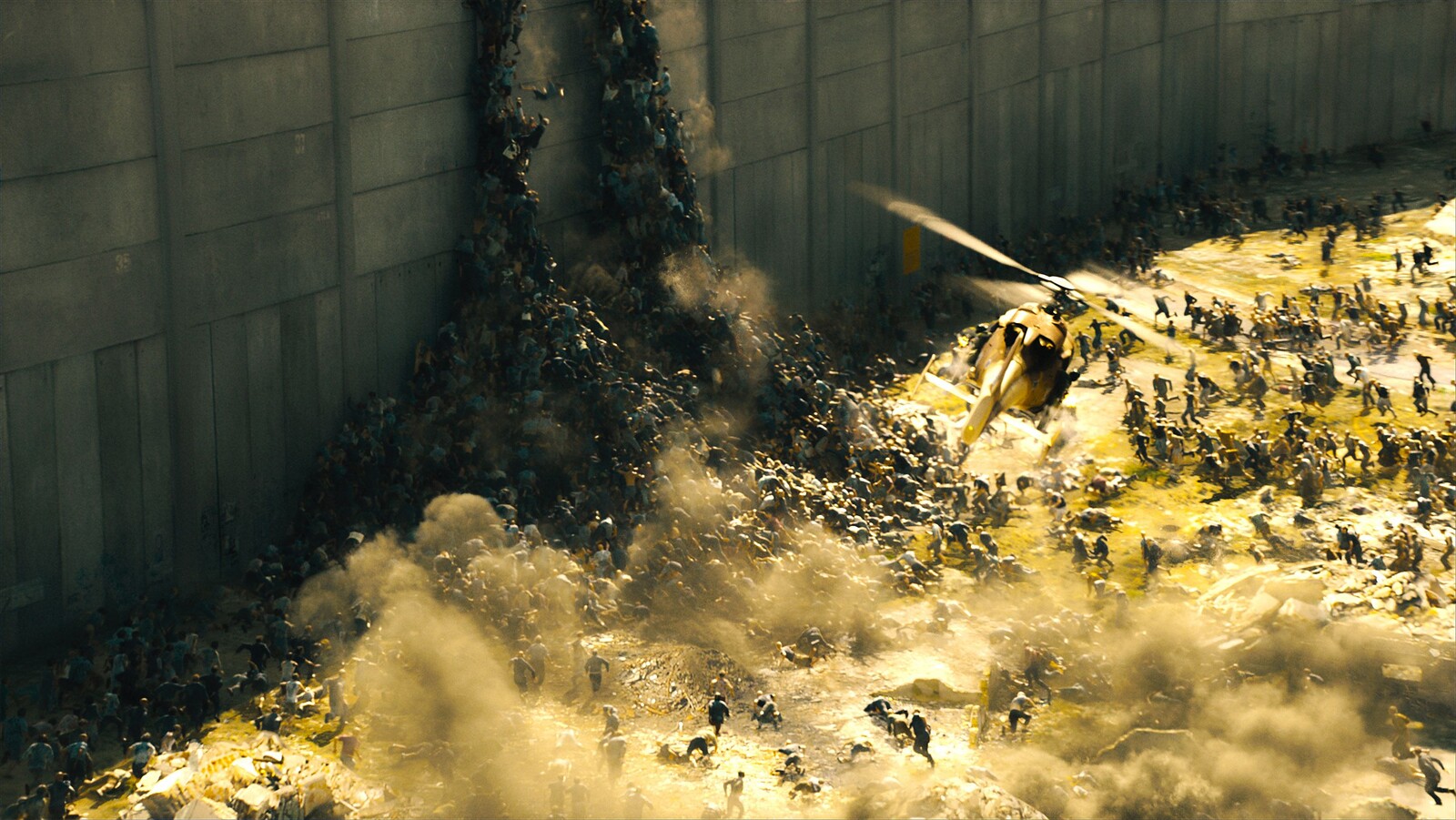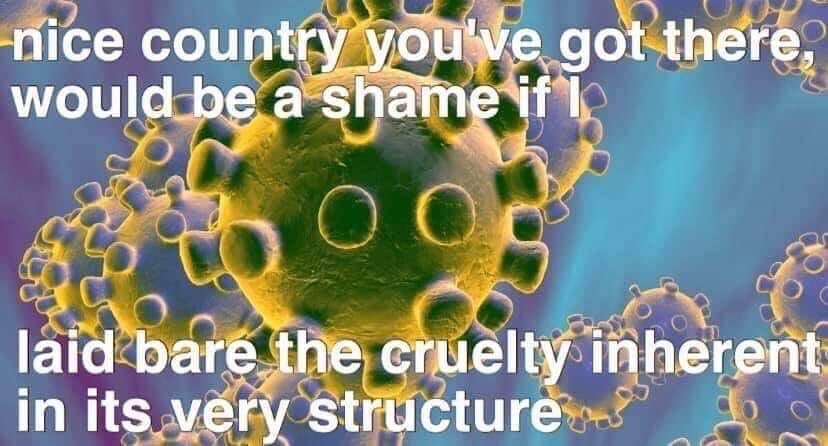

Uncredited Coronavirus meme, 2020
A contrast that matters. Former vice president Joe Biden appeals to the public in a pseudo-presidential address in the midst of his 2020 campaign for the presidency against Bernie Sanders, and calls for bipartisanship in the face of the COVID-19 outbreak, for the “coronavirus does not have a political affiliation.”1 Sanders also appeals to the public the same day, but instead critiques the $1.5 trillion infusion into Wall Street by the Federal Reserve to save profit-driven private companies, and drives home the added urgency of his key policy proposal, Medicare for All, especially in the midst of the outbreak, in which the most vulnerable and precarious among us will be hit hardest.2
Biden is wrong, as he has always been. COVID-19, or the “coronavirus,” certainly has a political affiliation—especially with big pharma and the securitization industry, which will make grotesque profits from the pandemic in the months ahead. The virus makes visible the ideological framework underlying our political, economic, and social infrastructures—or their ruins after decades of neoliberal austerity and privatization. A recent meme circulating on social media shows the image of a virus with the line “nice country you’ve got there, would be a shame if it laid bare the cruelty inherent in its very structure.” And this is exactly the point: the material propagation of the coronavirus makes visible a series of ideological propagations, both past and present, with severe real-life consequences. The question it lays bare is what alternative propagations can withstand the threat not just of the coronavirus, but of the far worse pandemics and system failures we will face in the climate catastrophes of the near future.
**
Let’s begin at the beginning. The coronavirus itself is inherently intertwined with global capitalism, which, as Mike Davis argues, “now appears to be biologically unsustainable in the absence of a truly international public health infrastructure.”3 Massive concentrations of livestock, hunting, and meat production have contributed to various pandemics of the past, and seem to have contributed to this one as well.4 More importantly, the replication of COVID-19 is furthered through global trade and transport, a network hailed as the best of all possible worlds, which again proves to be extremely vulnerable and in near immediate need of a financial infusion of taxpayer money—an infusion meant to keep intact the very system that creates the condition for these types of global contaminations in the first place. The climate catastrophe, which is enabled by the very same industrialist and extractivist mindset, will only amplify such pandemics in the near future.5 In the words of The Red Nation: “The crisis has exposed the capitalist system for what it is: anti-life.”6
Cheers for the expected reduction of CO2 emissions in the coming months as a result of the pandemic7—as if this was some global exercise in degrowth—ring hollow considering that the death toll will largely consist of people who are already extremely vulnerable, either due to preexisting illnesses, old age, homelessness, or imprisonment in refugee island camps in Greece or ICE detention prisons in the US that were already life-threatening in the first place. The damage to livelihoods caused by the pandemic will disproportionately affect the working and precarious classes, who simultaneously have to pay up to save private corporations and banks through tax infusions; the European central bank is already privileging financial markets over public health infrastructure, and we should not expect other governments to act any differently.8 The ruling classes will have their private clinics, respiratory support systems, and luxury bunkers—so the joy of Bolsonaro being contaminated or Trump being the next possible victim will be short lived.9 They were never going to suffer from this the way we will anyway. Even worse is the cynical ageist embrace of the virus as a way to rid the welfare state of elderly people, a dark foreshadowing of the genocidal engineering strategies of which we will hear more as the eco-fascist movement comes to the fore.10


Oppidum luxury bunker, undisclosed location, Czech Republic
All of this exemplifies a preexisting mentality, a preexisting propagation: every day, tens of thousands of people die because of poverty, exploitation, and warfare. Such people are now additionally confronted with this virus, and for them, regulations such as “social distancing,” regular handwashing with soap and water, and working from home sound absolutely absurd—consider just that 25 percent of the world population already does not have access to adequate sanitation.11 According to Edward Herman and Noam Chomsky, they fall into the category of those who, in the eyes of the imperialists, are to be considered “unworthy victims,” compared to their own “worthy victims”12—those who, in Judith Butler’s words, are consequently considered to be human enough to be “grievable.”13 In the context of a pandemic, it is no longer enough for the Global North to externalize the unworthy victims offshore—the unworthy ones now also come to include the elderly, the unemployed, those with preexisting conditions within our borders.
At this point, we have not even addressed the racialization of the coronavirus, the alt-right contagion that has spread even faster than the virus itself. Hate crimes against people of Asian descent, the equation of bodies of color with disease—this all follows the textbook propaganda strategy of Fritz Hippler’s Nazi faux-documentary Der ewige Jude (1940), in which rats and other vermin were used to allegorize Jews in Europe.14 Trump ideologue and filmmaker Steve Bannon was quick to embrace and propagate the narrative that the coronavirus is actually a bioweapon manufactured in a secret Chinese lab, which serves to deepen his narrative that the People’s Republic of China is at the center of a new axis of evil, while adding legitimacy to Trump’s border wall, as the virus and the migrant become conflated into one big threat aimed at infecting the sovereign body of the United States.15 In the meantime, Hungary’s far-right president, Viktor Orbán, claims a direct link between the coronavirus and the threat of “illegal” migration.16


Zombies overrun the West Bank occupation wall in Marc Foster (dir.), World War Z (2013)
Dozens of Hollywood pandemic movies have laid the groundwork for such narratives to capture the popular imagination. Whether it is the Motaba virus modelled after Ebola in Outbreak (1995), or the MEV-1 virus modelled after SARS in Contagion (2011), the virus always originates in a “foreign” body; for US empire, all that is foreign is to be both feared and extracted, whether it regards Zaire or Hong Kong. In World War Z (2013), the most telling scene is the arrival of survivors of a zombie plague in Israel, whose US-subsidized weapons and surveillance industry have made it the rare world actor capable of withstanding the contagion (a scenario that obviously aims to legitimize the maintenance of the occupation and its foreign backing in the present). In the film, it is singing by Arab refugees benevolently taken in by the occupier that finally triggers hordes of zombies to overtake the Israeli fortress despite all precautions, proposing the deeply offensive and revisionist narrative that it is essentially Israeli altruism that forms its true vulnerability.17
Such pandemic disaster cinema has engrained in us certain behavioral responses to disaster, whether it concerns yet another zombie-type virus in 28 Weeks Later (2002), in which survivors become a worse threat to one another than the zombies are to them, or the more allegorical—and more intelligent—infertility epidemic in Children of Men (2006). We, the precariat, are expected to largely fend for ourselves, hoard food, medicine, and weapons, and trust governing elites to impose brutal securitization measurements upon us, praying that we are exempted from its worst consequences (while they themselves save art treasures to gaze upon in their securitized private bunkers). It is a narrative that supposes social psychology never moved beyond Gustave Le Bon’s The Crowd: A Study of the Popular Mind (1895).
And let us not forget that decades of war-gaming, developed by the likes of the RAND Corporation, have instilled that very mindset into governing elites. Think of the Atlantic Storm game, staged by the Center for Biosecurity at the University of Pittsburgh Medical Center in 2005 as a ministerial tabletop exercise.18 The script starts with a fictional multination summit meeting in Washington, DC, when reports suddenly come in that a massive terrorist attack in Europe is taking place in the form of a rapidly spreading smallpox virus.19 Senior government leaders played the role of heads of state assembled at the summit, with Madeleine Albright acting as the president of the United States.20 As news of casualties rolls in, the message of the game scenario is clear: the combination of disease and terrorism poses a threat greater than all the wars of the past century combined, cultivating a scenario in which only the most drastic responses are imaginable—militarization of public health infrastructures, extreme securitization, a disregard for any existing laws, and unlimited patriotism and nationalism to protect at least part of the population. In other words, from the perspective of Atlantic Storm, the world is no longer governable through common means—a situation familiar to the Italian government, when informed that Germany refused to send medical supplies to Rome to help with the coronavirus outbreak: all can ungovern for themselves.21


Atlantic Storm (2005), Center for Biosecurity at the University of Pittsburgh Medical Center
This instant move towards extreme militarization might not seem like the current overall response by governments in the Global North, who so far have largely privileged the continuity of economic activity and the healthy pulse of the Dow Jones rather than the healthy pulse of the actual living and breathing members of their populations—the United Kingdom’s “herd immunity” being amongst the most cynical strategies, brutally weighing the collateral damage of its own seemingly disposable population against the greater good of market stability.22 It’s a strategy that the UK government was forced to walk back after public outcry, but it has now been adopted by the Dutch government instead.23 But as governments are now slowly realizing that lockdown is the only scenario, we need to be prepared for the trained Atlantic Storm mindset to come into play, with the help of the security industry, for which a pandemic is nothing but the next market opportunity. And while the virus, as some governments have shown, is very containable, we will need to keep the dangerous imprint of the ungovernable world in mind for the inevitable climate-fueled crisis of pandemics, food scarcity, and millions of climate refugees yet to come.
**
The “shock doctrine” conditions emerging now enable different pathways forward: they can become the basis for the propagation of austerity, racism, and mass securitization, but they can also be the basis for the propagation of radical new forms of socialization and collective care. In the words of Naomi Klein, speaking out on the pandemic:
If there’s one thing history teaches us it’s that moments of shock are profoundly volatile. We either lose a whole lot of ground, get fleeced by elites, and pay the price for decades, or we win progressive victories that seemed impossible just a few weeks earlier. This is no time to lose our nerve. The future will be determined by whoever is willing to fight harder for the ideas they have lying around.24
In José Saramago’s novel Blindness (1998), a small group of quarantined people try to survive an epidemic of blindness in an unspecified country. In the story, the securitization narrative is central. But in Saramago’s subsequent novel, Seeing (2004), the epidemic is no longer biological but social: at election time, people vote for nobody, leaving the ballot blank instead. No matter what anti-terrorist policies the government of the same unspecified country impose to deter this “subversive” behavior, people leave the ballot blank in higher and higher numbers. As punishment, the government decides to abandon its people, and the people in turn respond by organizing collective health care and food distribution themselves.
For a long time, I wrongfully believed that Seeing was a manifesto for leaving the ballot blank. But no. It is a literary manifesto for our ability to respond differently and transformatively to the crises that the regimes under which we live impose upon us. The Democratic Party establishment frames a vote for Sanders as a blank vote, because he supposedly never got anything done as a senator, and never will get anything done as president. Better to vote for Biden, they say, and join those who maintain the status quo of an ungovernable world responsible for the crises of the past, present, and future, in which we are left to pray for individual survival. But this is not a world worth propagating.


Balcony music performances in Milan, Italy, March 14, 2020
Instead, in Italy, the streets are filled with chants of solidarity from balcony to balcony. Autonomists groups have quickly organized the necessary structures of life support.25 Comrades—when they have the fortunate conditions to do so—practice social distancing to be nearer to one another, as they further socialize goods and digital means of communication to enable alternative modes of gathering and assembly. Health care workers share their own health with those affected. Unions are at the doors of parliament demanding compensation for the precarious classes, and cultural workers popularize the demand “Close everything, pay everyone!”26 Cultural institutions livestream their programs for free (some of these institutions, such as large museums and operas, understood little about free access until now). Activists and social workers demand the immediate evacuation of Moria refugee camp in Greece. Spain’s first left government since the end of fascism has instantly taken control over private health infrastructures—and now it’s up to us to make sure they never privatize it back again.27 And Sanders, our president, militantly defends the infrastructures of care that will help us survive this present, enabling a future in this radically transformed world. As Jodi Dean has noted:
The truth of capitalism presents itself in all its naked horror in a crisis. Everyone hates the hoarders and profiteers. We appreciate purchase limits, laws against price gouging. We all recognize that healthcare is too important to be left to the market. As the cruelty of the market appears without its ideological sheen, more and more people realize the necessity—for the good of all—of free medical care, of paid medical leave, of a social safety net. Everyone’s a socialist now (whether they have recognized it or not).28
These propagations show a different contamination, a socialist virus for the twenty-first century that we need not contain, but instead enable to spread fast, as fast as possible, through all means at our disposal: through our art and literature, our poetry and film, our activism and agitation. For the elites, this might be an ungovernable world. But we still have many worlds to propagate, to live and love in comradely care.
Full press conference: Joe Biden, March 12, 2020, Washington Post →.
Full press conference: Bernie Sanders, March 12, 2020, NBC News →.
Mike Davis, “COVID-19: The Monster Is Finally at the Door,” LINKS: International Journal of Socialist Renewal , March 12, 2020 →.
Yaak Pabst, “Capitalist Agriculture and Covid-19: A Deadly Combination,” Climate & Capitalism , March 11, 2020 →.
Karen McVeigh, “Experts Warn World ‘Grossly Unprepared’ for Future Pandemics,” The Guardian, September 18, 2019 →.
The Red Nation, “The COVID-19 Pandemic: Capitalism in Crisis,” therednation.org, March 16, 2020, →.
Martine Orange, “Europe Is Saving the Financial Markets, But Not Coronavirus Victims,” Jacobin, March 14, 2020 →.
Rupert Neate, “Super-Rich Jet Off to Disaster Bunkers Amid Coronavirus Outbreak,” The Guardian, March 11, 2020 →.
Joe Roberts, “Telegraph Journalist Says Coronavirus ‘Cull’ of Elderly Could Benefit Economy,” Metro, March 11, 2020 →.
CDC Centers for Disease Control and Prevention, “Global WASH Fast Facts” →.
Noam Chomsky and Edward S. Herman, Manufacturing Consent (Pantheon Books, 1988), 39.
Judith Butler, Precarious Life (Verso, 2004).
Suyin Haynes, “As Coronavirus Spreads, So Does Xenophobia and Anti-Asian Racism,” TIME, March 6, 2020 →.
Madeline Peltz, “Steve Bannon Gave An Interview to Conspiracy Site Linked to his Billionaire Benefactor,” Mediamatters for America, February 27, 2020 →.
“Orbán to EU Counterparts: Clear Link between Coronavirus and Illegal Migration,” Hungary Today , March 11, 2020 →.
Matt Vornell, “Where the Z Stands for Zionism,” Al Jazeera, July 17, 2013 →.
“Atlantic Storm,” Center for Biosecurity at the University of Pittsburgh Medical Center, 2005 →.
Joseph Masco, The Theater of Operations: National Security Affect from the Cold War to the War on Terror (Duke University Press, 2014), 173.
Bradley T. Smith et al., “Navigating the Storm: Report and Recommendations from the Atlantic Storm Exercise,” Biosecurity and Bioterrorism: Biodefense Strategy, Practice, and Science 3, no. 3 (2005): 258.
“Italy Wonders Where Europe’s Solidarity Is as Coronavirus Strains Show,” Financial Times, March 13, 2020 →.
Sarah Boseley, “Herd Immunity: Will the UK’s Coronavirus Strategy Work?,” The Guardian , March 13, 2020 →.
Naomi O’Leary, “Coronavirus: Dutch Adopt Controversial ‘Herd Immunity’ Strategy,” The Irish Times , March 17, 2020 →.
Naomi Klein, “Coronavirus Capitalism – and How to Beat It,” The Intercept , March 16, 2020 →.
“Autonomous Groups Are Mobilizing Mutual Aid Initiatives To Combat The Coronavirus,” It’s Going Down , March 14, 2020 →.
“Museums, Galleries, Art Fairs, Art Centers, Universities, Theaters, Festivals … Cancel Everything, Pay Everyone!,” Documentations, March 14, 2020 →.
John Henley, Kim Willsher, Ashifa Kassam, “Spain takes over private healthcare amid more European lockdowns,” The Guardian, March 16, 2020 →.
Facebook post, March 14, 2020.
